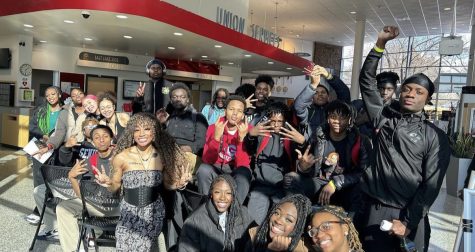Theatre searches for King Joseph
EVERYONE knows what a musical is, but not everyone knows how the process of an audition works. Here at Granger High, auditions just took place for Joseph and The Amazing Technicolor Dreamcoat, which will be performed during the spring.
Auditions for the show took place the first week of December, and a large cast was needed. This is a very active show about the book of Genesis from the Bible with an added dash of Broadway magic. Students auditioning had to perform 30 seconds of a popular song.
A good number of Lancers auditioning were involved with theatre years before, but for others, it was their first year in theatre. This being said, some students had not been in a musical for a while or even a play, although this was not a barrier for them. “I feel like I am definitely rusty, but I am prepared, and I can definitely always learn more,” Melanie Dutton (11) said.
The process of an audition depends on the type of show. For plays, the auditionee is required to perform two contrasting monologues, each being one minute long. However, for a musical, the auditionee is required to perform 30 seconds of a Disney or Broadway song.
Almost all of the students auditioning were nervous. Some were nervous because of the high number of auditionees, or performance anxiety. Being nervous is normal with auditions.
“I am not nervous right now, but you can be prepared and as soon as you walk in the room all the fear will hit you, because it’s always scary to audition,” Jonathan Harr (12) said.
Auditions are great because it can be a way to discover new features and techniques. The director of the play has a goal, which is to fill every role—but this does not guarantee a place in the musical.
Most auditions are not based only on talent. “Auditions are not solely talent-based, they just mean you’re the right person for the show and cast, so you can’t let an audition dictate your personal value,” Ms. Anderson, a drama teacher, said.
The director makes the final choice, and it is strictly prohibited to cast someone just because they’re good friends with the director. The director makes decisions based on what the script requires—simply being in theatre for a long time does not guarantee a spot.
Callbacks are additional auditions for specific roles that are decided by the director in order for an auditionee to perform a specific passage from the script or a song from the show.
Callbacks do not mean an earned spot either, it means the director needs more from an auditionee to make a final decision. Not everyone is called back, and that also does not mean anything, it could mean being cut or the director already has an idea of what roles certain auditionees will be placed in.
For most auditionees, what the director thinks is a stress and usually it is over-thought. “I feel like this might be selfish, but what I do is just not care what anyone thinks, and I just do what I have to do. I only care about my audition and no one else’s,” Alton Phonepraseuth (12) said.










